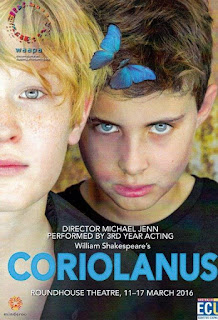It’s fitting this play ends with the three sisters, Olga
(Natasha Vickery), Masha (Laura McDonald), and Irina (Rhianna McCourt) grouped
closely together, two in tears, the oldest searching for hope in their predicament.
All three actresses give wonderfully assured and nuanced performances in a debut
that bodes very well for the next two years.
Vickery plays the de facto mother figure not only with an
air of practicality but a sense that there is such generosity of spirit in Olga
especially when defending Anifisa (Stephanie Somerville) against the vindictive
Natalia (Sasha Simon).
McDonald whose character is described as “stunning and
magnificent” is all that but it’s the contrasts in her portrayal of Masha, from
melancholy to barely suppressed happiness on entering an illicit affair to utter
devastation at the loss of her lover, that impresses. Her emotional breakdown
in the fourth act is as gut-wrenching as it is removed from all ego. The barely
concealed contempt of Natalia is Arctic cold; her smile vibrant when she’s with
Vershinin (Mitchell Bourke).
Then there’s McCourt as the youngest sister, Irina, who
longs to go back to Moscow even to the extent of marrying someone she does not
love in Baron Tuzenbach (Jake Fryer-Hornsby). With an expressiveness that
belies her age, McCourt lets Irina’s emotion flicker across her face to
stunning effect – her reaction to firstly the abrupt Solyony (Charles
Alexander) and later the Baron himself in courting her is sublime. Shock,
horror, loathing, resignation, desperate attempts to convince herself of the
possibility of happiness, an abject longing to travel to Moscow, the love for
her sisters and fondness for Ivan Chebutykin (Frazer Lee) are all communicated throughout
the play without a word. The realisation at the fate of her betrothed leading
to Irina’s own descent into tears is powerfully moving.
Around this excellent core are many fine performances. Raj
Joseph presents Masha’s husband, Kulygin, as fastidious and almost comical at
first but becomes far more sympathetic in how he deals with his wife’s
betrayal. Elliot Giarola’s Andrey, the brother, begins with high and lofty
aspirations but his marriage to Natalia precipitates a descent into debt and
self-doubt until he is as trapped as everyone else, through circumstance or
geography or in carefully constructed emotional prisons.
Simon effectively swings between two extremes as Andrey’s
wife – the doting mother or demanding harridan who cuckolds Andrey and
alienates the sisters whose house she takes over. Lee is a warm and likable
presence in the early going as the 62 year old doctor Ivan Chebutykin but even this jovial character succumbs to doubt and is left in resigned lethargy as tragedy strikes.
Alexander is a little one note as the aggressive Solyony who
promises to deny the claims of any other suitor after being turned down by
Irina. He does this well, however, with a physically imposing presence and this
attitude is essential to the development that cruels Irina’s chance of escape. His
rival, the Baron, is portrayed with straightforward earnestness by
Fryer-Hornsby as he extols the virtue of work and engages in philosophising
about the future.
I enjoyed Bourke’s turn as the army colonel in his
mid-40s who is married to a woman who constantly threatens to poison herself
but he doesn’t quite have the authority or gravitas yet to completely inhabit
the middle-aged officer. He does give Vershinin a poetic idealism that attracts
Masha’s attention and captivates her to the point where they begin an affair.
McDonald and Bourke have lovely moments together as this relationship blossoms
from tentative beginnings.
It is a most handsome production to look at - excellent
costumes with the men in their bold military uniforms, the sisters in full
length attire with flowing skirts; a detailed and well-furnished set that
captures the mood and period of a well off family in a provincial military
town; and there is an excellent aural landscape enhanced by the cast singing a variety
of Russian songs.
Usually the Enright Studio is my least favourite venue on
the ECU campus but director Bagryana Popov has removed a side of seating giving
more space to the actors while conversely making this feel far more intimate as
a result. I particularly liked how we often heard characters off stage before
they made their entrances from various spots in the black box studio. This added to the sense of a fully realised
world outside the confines of the house.
Written by Anton Chekhov and directed by Popov, Three Sisters featured the 2nd year acting students with alternating actors playing the Prozorov family and Kulygin. I saw the Family One cast.




